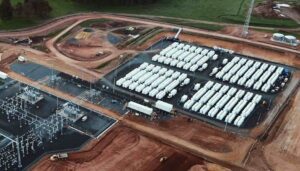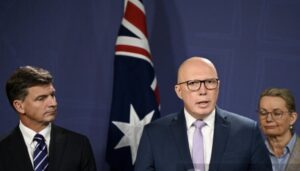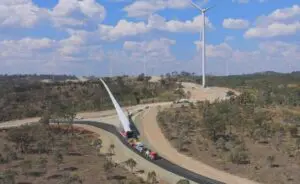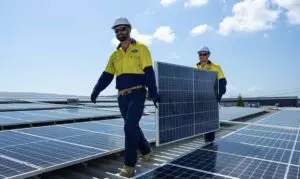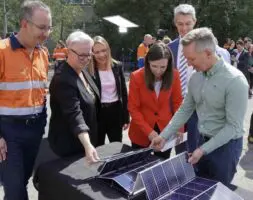Most of Australia’s incumbent electricity generators have decided to fight a proposed rule change that could help reduce wholesale electricity costs and pave the way for more battery storage, but may also force out some gas-fired peaking plant from the energy system.
The proposal, launched by a major smelting business Sun Metals, and supported by regulators and the emerging battery storage industry, seeks to remove market distortions, level the playing field for battery storage, lower prices for consumers, and wrest control of the energy markets from the big generators.

It comes at a critical time for the industry, which is witnessing soaring electricity prices in a market that is dominated by coal and gas-fired generators. The rising cost of gas, and the inability of new technologies such as battery storage to penetrate the market, is causing huge spikes in the market price, particularly in South Australia.
Many consider the changes essential to address those issues, and encourage a smart, fast response grid. But the owners of the big coal generators and the less-speedy gas peaking plants are refusing to budge, just as they refused to budge when policy makers proposed increased renewable energy.
Some are wondering just how committed these generators are to their rhetoric about a future, smart grid when they are resisting such changes. Such resistance is designed to protect a big, dumb and slow grid, when new technologies should be taking the country to a smarter, cleaner and cheaper energy system.
As we reported last month, the proposal from Sun Metals seeks to change an obscure rule that states that pricing in the volatile electricity wholesale market is set every five minutes, but financial settlement is made only every 30 minutes. Sun Metals says, and regulators and most participants agree, that this leads to distortions in the market.
The rule change, however, is also seen an opportunity to wrest control from big, bulky, slow-response generators and encourage smarter, smaller, fast-response distributed generation, particularly battery storage and software for energy management systems.
But despite gaining the support of key regulators, such as the Australian Energy Market Operator and the Australian Energy Regulator, the big generators – many of whom have gas-fired peaking plants that can “play the market” – are opposing it, citing operational difficulties and costs.
The big generators insist that the current market design is fine, say the proposed changes will be costly, and could lead to some peaking gas plants being withdrawn from the market. They also want to see if new “bidding in good faith” rules eradicate some of the wild bidding patterns blamed for some huge price spikes.
“AGL does not consider that there is a material problem with the design of the wholesale electricity market to the extent that changes to market settlement times are warranted,” AGL Energy said in its submission. “Accordingly, AGL does not support the proposed rule change.”
It also says that moving to 5 minute settlement will “cloud” the incentives of fast start generators during a price spike event, because they are not as fast as battery storage and most take longer than 5 minutes to respond. It says this could result in some peaking plants leaving the market.
Snowy Hydro, which operates hydro generators and gas peakers, also said it opposes the move. “There is no material problem that warrants the major costs and disruption that would result from the proposed rule,” it said. Other major generators such as Engie, ERM Power, Origin Energy, Energy Australia and Stanwell also opposed the move.
So, too, did the peak body that represents the fossil fuel generators, the Energy Supply Council. It opposes the rule change because it would lead to a “flawed market design” and because “it is technically unworkable.”
That’s not the view of the Australian Energy Market Operator, which as its name suggests, runs the market. It supports the proposed rule change. “We consider the proposed solution would be practical and effective in addressing the issues raised,” it says in its submission.
The Australian Energy Regulator also supports the idea, saying it will improve market signals, enhance competition, and provide increased value for flexibility that may encourage new technologies. “We consider that this will ultimately benefit consumers and producers alike,” it says.
“For the RET they lined up against a mechanism that pumps large scale renewables into a market where they have incumbent fossil fuel supply that will get squeezed out,” noted one observer with an interest in the outcome.
“With 5 minute settlement they’re lining up against an incentive for the next piece in the puzzle, the storage and flexible demand capacity that needs to be there to support a National Electricity Market with a high proportion of renewables.”
This observer said the so called “gentailers” were particularly sensitive to the rule change. On the generation side, the rule change provided incentives to new flexible capacity (both supply and demand side) that will crowd out their plant, particularly their peaking plant that can’t quite respond in a 5 minute interval.
And their retail business model is impacted because their profit is linked to customer usage. If customer usage goes down because of batteries and flexible demand, the traditional retail model loses out (even if the customer would be better off).
The Melbourne Energy Institute also filed a submission that supports the rule change. It says the current mismatch between settlement and dispatch diminishes the value of having fast dispatch, encourages sub-economic dispatch, and does not provide appropriate incentives for fast response generation.
It also creates opportunities for what it describes as “creative compliance” , or rebidding, a feature of the market that is often blamed for major price surges, to the benefit of many generators but at the cost to consumers.
The MEI cited some examples, including a pattern of rebidding that mysteriously fell at exactly the same time (6.55am) on successive days at several times in the year. Rebidding in the last five minutes of a 30 minute settlement period can inflate the final price.
The MEI says these spikes can come at significant cost. Its analysis of Queensland dispatch and settle- ment data suggest that in 2015, price spikes in the last 5 minutes of an interval added $250 million to the turnover through the wholesale market.
Some market participants believe that is what the market is witnessing now, with huge spikes in prices that are not entirely explained by the recent surge in gas prices. The regulators, we are told, are keeping a keen eye on proceedings.


